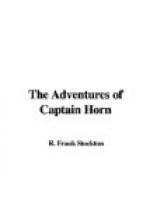CHAPTER
I An Introductory Disaster
II A New Face in Camp
III A Change of Lodgings
IV Another New Face
V The Rackbirds
VI Three Weld Beasts
VII Gone!
VIII The Alarm
IX An Amazing Narration
X The Captain Explores
XI A New Hemisphere
XII A Tradition and a Waistcoat
XIII “Mine!”
XIV A Pile of Fuel
XV The Cliff-Maka Scheme
XVI On a Business Basis
XVII “A Fine Thing, No Matter What Happens”
XVIII Mrs. Cliff is Amazed
XIX Left Behind
XX At the Rackbirds’ Cove
XXI In the Caves
XXII A Pack-Mule
XXIII His Present Share
XXVI His Fortune under his Feet
THE ADVENTURES OF CAPTAIN HORN
CHAPTER I
AN INTRODUCTORY DISASTER
Early in the spring of the year 1884 the three-masted schooner Castor, from San Francisco to Valparaiso, was struck by a tornado off the coast of Peru. The storm, which rose with frightful suddenness, was of short duration, but it left the Castor a helpless wreck. Her masts had snapped off and gone overboard, her rudder-post had been shattered by falling wreckage, and she was rolling in the trough of the sea, with her floating masts and spars thumping and bumping her sides.
The Castor was an American merchant-vessel, commanded by Captain Philip Horn, an experienced navigator of about thirty-five years of age. Besides a valuable cargo, she carried three passengers—two ladies and a boy. One of these, Mrs. William Cliff, a lady past middle age, was going to Valparaiso to settle some business affairs of her late husband, a New England merchant. The other lady was Miss Edna Markham, a school-teacher who had just passed her twenty-fifth year, although she looked older. She was on her way to Valparaiso to take an important position in an American seminary. Ralph, a boy of fifteen, was her brother, and she was taking him with her simply because she did not want to leave him alone in San Francisco. These two had no near relations, and the education of the brother depended upon the exertions of the sister. Valparaiso was not the place she would have selected for a boy’s education, but there they could be together, and, under the circumstances, that was a point of prime importance.
But when the storm had passed, and the sky was clear, and the mad waves had subsided into a rolling swell, there seemed no reason to believe that any one on board the Castor would ever reach Valparaiso. The vessel had been badly strained by the wrenching of the masts, her sides had been battered by the floating wreckage, and she was taking in water rapidly. Fortunately, no one had been injured by the storm, and although the captain found it would be a useless waste of time and labor to attempt to work the pumps, he was convinced, after a careful examination, that the ship would float some hours, and that there would, therefore, be time for those on board to make an effort to save not only their lives, but some of their property.




